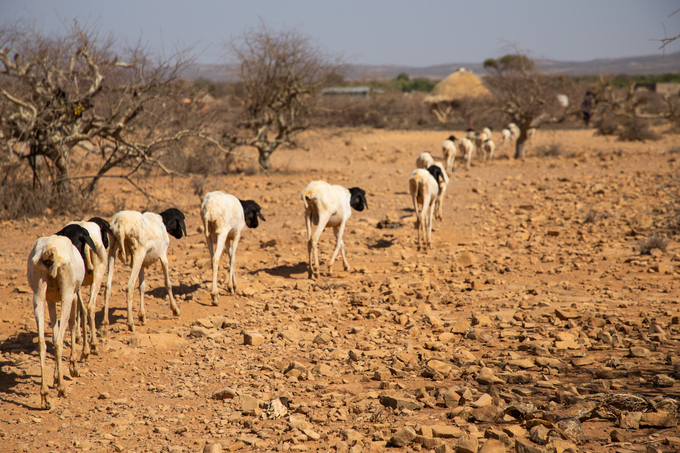May 21, 2025 | 03:36 GMT +7
May 21, 2025 | 03:36 GMT +7
Hotline: 0913.378.918
May 21, 2025 | 03:36 GMT +7
Hotline: 0913.378.918

Livestock in drought-struck Ethiopia.
The benchmark index of international food commodity prices declined in February for the eleventh consecutive month, albeit only marginally, the Food and Agriculture Organization of the United Nations (FAO) reported today.
The FAO Food Price Index averaged 129.8 points in February, a marginal 0.6-percent decrease from January but 18.7 percent down from its peak in March 2022. The decline in the index, which tracks monthly changes in the international prices of commonly-traded food commodities, reflected drops in quotations for vegetable oils and dairy products that more than offset a steep rise in sugar prices.
The FAO Cereal Price Index remained virtually unchanged from January. International wheat prices rose marginally during the month, as concerns over dry conditions in the United States of America and robust demand for supplies from Australia were largely countered by a strong competition among exporters. International rice prices eased by 1.0 percent due to a slowdown in trading activities in most major Asian exporters, whose currencies also depreciated against the United States dollar.
The FAO Vegetable Oil Price Index declined 3.2 percent from January, with the world prices of palm, soy, sunflowerseed and rapeseed oils all lower.
The FAO Dairy Price Index declined 2.7 percent during the month, with butter and skim milk powder international quotations registering the steepest decline.
The FAO Meat Price Index also remained almost unchanged from January. World poultry prices continued to decline amid abundant export supplies, notwithstanding the avian influence outbreaks in several leading producer countries, while international pig meat prices rose, mostly due to concerns over tighter export availabilities in Europe.
In contrast, the FAO Sugar Price Index rose 6.9 percent from January to its highest level in six years, due largely to a downward revision to the 2022/23 production forecast in India, although favorable crop prospects in other suppliers, combined with lower international crude oil prices and ethanol prices in Brazil, limited upward pressure on sugar prices.
Early production outlook for 2023 wheat crops
In its latest Cereal Supply and Demand Brief, also released Friday, FAO released its preliminary forecast for world wheat production in 2023, predicting a global outturn of 784 million tonnes, which would be the second highest on record though down from the previous year. Strong outputs are expected in North America, as farmers increase acreage in response to high grain prices.
In southern hemisphere countries, the production outlook for coarse grain crops in 2023 is generally favourable, and total maize plantings in Brazil are foreseen to reach a record level.
FAO has also revised upwards its projection for world cereal production in 2022 to 2 774 million tonnes, still 1.3 percent lower than in 2021.
Global cereal utilization in 2022/23 is forecast at 2 780 million tonnes, representing a 0.6-percent decline from the previous season, largely due to an anticipated contraction in the utilization of all major coarse grains.
FAO forecasts global cereal stocks ending in 2023 to decline by 1.2 percent from their opening levels, down to 844 million tonnes, as drawdowns in coarse grain and to a lesser extent rice stocks are foreseen to outweigh an expected build-up in wheat inventories. Based on the new forecasts, the world cereal stocks-to-use ratio would stand at 29.5 percent, deemed an “overall comfortable level”.
World trade in cereals is predicted to contract by 1.8 percent to 473 million tonnes.
Crop prospects and the food situation
Droughts, conflict and high prices, along with macroeconomic predicaments, are exacerbating food insecurity in many countries. A total of 45 countries around the world are assessed to need external assistance for food, according to the latest Crop Prospects and Food Situation report, a quarterly publication by FAO’s Global Information and Early Warning System (GIEWS), also published today.
Some people in six countries are experiencing, or expected to experience soon, severe levels of acute food insecurity, defined as level 5 of the Integrated Food Security Phase Classification (IPC 5) or catastrophic hunger: Burkina Faso, Haiti, Mali, Nigeria, Somalia and South Sudan. Millions more face severe hunger, according to the report.
Even as the FAO Food Price Index have eased somewhat in recent months, domestic food price inflation is at prohibitively high levels in many countries. For instance, coarse grain prices in Ghana in January were 150 percent higher than a year earlier, and grain prices were at all-time highs in Malawi and Zambia. An aggregate increase in cereal production among the world’s 47 Low-Income Food Deficit Countries (LIFDCs) in the current agricultural season have helped assuage the impacts of higher global commodity prices, but production downturns and currency weakness in many others will keep the food import bills of LIFDCs at high levels, the report said.
The Crop Prospects and Food Situation report offers more findings from around the world and flags the alarming situation in East Africa, home to the worst drought in the last 40 years.
(FAO.org)

(VAN) Attempts to bring down the price of the Japanese staple have had little effect amid a cost-of-living crisis.

(VAN) Fourth most important food crop in peril as Latin America and Caribbean suffer from slow-onset climate disaster.

(VAN) Shifting market dynamics and the noise around new legislation has propelled Trouw Nutrition’s research around early life nutrition in poultry. Today, it continues to be a key area of research.

(VAN) India is concerned about its food security and the livelihoods of its farmers if more US food imports are allowed.

(VAN) FAO's Director-General emphasises the need to work together to transform agrifood systems.

(VAN) Europe is facing its worst outbreak of foot-and-mouth since the start of the century.

(VAN) The central authorities, in early April, released a 10-year plan for rural vitalization.